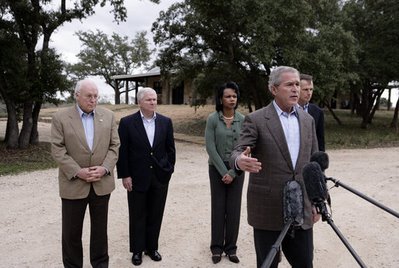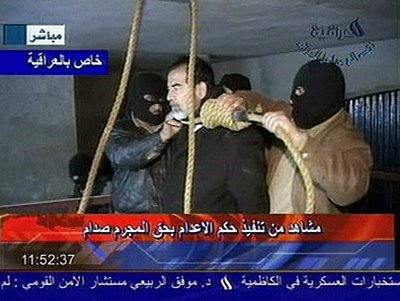Bush lies continue as rights groups condemn Saddam Hussein’s execution; U.S. military deaths in Iraq reach 3,000
2,860
Reuters
Sunday, December 31, 2006; 2:46 PM
WASHINGTON (Reuters) - The number of
The milestone comes as President George W. Bush weighs options, including more troops, for the deteriorating situation in
The Web site, www.icasualties.org, listed the death of Spec. Dustin R. Donica, 22, on December 28 as previously unreported, and said that 3,000
A
The grim numbers since
March 20, 2003 through May 1, 2003 (the end of major combat): 140 casualties.
May 2, 2003 through June 28, 2004 (sovereignty turned over of to
June 29, 2004 (the day after the official turnover of sovereignty to
January 31, 2005 (the day after Iraq Elections) through December 14, 2005 (Iraq General Elections): 715 casualties.
December 15, 2005 (the day after Iraq General Elections) through December 30, 2006: 848 casualties.
Often forgotten is the number of Iraqi civilians that have been killed since March 2003. In December 2005, President Bush said the toll, up until then, was “30,000, more or less.” The number to date has been estimated by some to exceed 100,000. No one knows for sure. The Pentagon says it doesn’t keep track.
The Iraq Body Count project (IBC) is an attempt to record civilian deaths resulting from the 2003 invasion of
President Bush's Statement on Execution of Saddam Hussein
“Today, Saddam Hussein was executed after receiving a fair trial -- the kind of justice he denied the victims of his brutal regime.”
President George W. Bush is joined by, from left to right, Vice President Dick Cheney, Secretary of Defense Robert Gates, Secretary of State Condoleezza Rice and Chairman of the Joint Chiefs of Staff General Peter Pace, as he speaks with reporters following his meeting with his national Security team Thursday, Dec. 28, 2006, at Prairie Chapel Ranch in
Saddam had proper trial, PM says
December 30, 2006
[Australian] Prime Minister John Howard says a fair and proper trial was given to former Iraqi dictator Saddam Hussein.
“The real significance is that this man has been given a proper trial, due process was followed,” Mr. Howard said.

This image taken from Al-Iraqiya television Sunday, Dec. 31, 2006 shows a truck carrying the coffin containing the body of executed former Iraqi President Saddam Hussein late Saturday, Dec. 30, 2006 in
Human Rights Watch
News Release
Hanging After Flawed Trial Undermines Rule of Law
(
Human Rights Watch has for more than 15 years documented the human rights crimes committed by Hussein’s former government, and has campaigned to bring the perpetrators to justice. These crimes include the killing of more than 100,000 Iraqi Kurds in
“Saddam Hussein was responsible for massive human rights violations, but that can’t justify giving him the death penalty, which is a cruel and inhuman punishment,” said Richard Dicker, director of Human Rights Watch’s International Justice Program.
The Iraqi High Tribunal sentenced Saddam Hussein and two others to death in November for the killing of 148 men and boys from the town of
Human Rights Watch opposes the death penalty in all circumstances. Increasingly, governments are abolishing the death penalty in domestic law.
“The test of a government’s commitment to human rights is measured by the way it treats its worst offenders,” said Dicker. “History will judge these actions harshly.”
A report issued in November 2006 by Human Rights Watch identified numerous serious flaws in the trial of Hussein for the Dujail executions. The 97-page report, “Judging Dujail: The First Trial Before the Iraqi High Tribunal,” was based on 10 months of observation and dozens of interviews with judges, prosecutors and defense lawyers.
The report found, among other defects, that the Iraqi High Tribunal was undermined from the outset by Iraqi government actions that threatened the independence and perceived impartiality of the court. It outlined serious flaws in the trial, including failures to disclose key evidence to the defense, violations of the defendants’ right to question prosecution witnesses, and the presiding judge’s demonstrations of bias.
Hussein’s defense lawyers had 30 days to file an appeal from the November 5 verdict. However, the trial judgment was only made available to them on November 22, leaving just two weeks to respond. The Appeals Chamber announced its confirmation of the verdict and the death sentence on December 26.
“It defies imagination that the Appeals Chamber could have thoroughly reviewed the 300-page judgment and the defense’s written arguments in less than three weeks’ time,” said Dicker. “The appeals process appears even more flawed than the trial.”
At the time of his hanging, Saddam Hussein and others were on trial for genocide for the 1988 Anfal campaign. The victims, including women, children and the elderly, were selected because they were Kurds who remained on their traditional lands in zones outside of areas controlled by
---------------------------------------------------------
Amnesty International
News Release
press release, 30.12.2006
Amnesty International deplored the execution today of Saddam Hussein following the confirmation of his sentence by the Iraqi
The organization, which totally opposes the use of the death penalty, said it was concerned that the Iraqi Appeals Court had failed to address the major flaws during the former dictator's trial before the Supreme Iraqi Criminal Tribunal (SICT) which had rendered it unfair.
"We oppose the death penalty in all cases as a violation of the right to life and the ultimate cruel, inhuman and degrading punishment, but it is especially abhorrent when this most extreme penalty is imposed after an unfair trial," said Malcolm Smart, Director of Amnesty International's
Amnesty International said it had greatly welcomed the decision to hold Saddam Hussein to account for the crimes committed under his rule but this should have been done through a fair process. "His trial should have been a major contribution towards establishing justice and ensuring truth and accountability for the massive human rights violations perpetrated when he was in power, but his trial was a deeply flawed affair" said Malcolm Smart. "It will be seen by many as nothing more than 'victor's justice' and, sadly, will do nothing to stem the unrelenting tide of political killings."
Saddam Hussein was sentenced to death on 5 November 2006 after being convicted in connection with the killing of 148 people from al-Dujail village after an attempt to assassinate him there in 1982. The trial, which began in October 2005 almost two years after Saddam Hussein was captured by US forces, ended last July. The
The trial before the SICT failed to satisfy international fair trial standards. Political interference undermined the independence and impartiality of the court, causing the first presiding judge to resign and blocking the appointment of another, and the court failed to take adequate measures to ensure the protection of witnesses and defence lawyers, three of whom were assassinated during the course of the trial. Saddam Hussein was also denied access to legal counsel for the first year after his arrest, and complaints by his lawyers throughout the trial relating to the proceedings do not appear to have been adequately answered by the tribunal. The appeal process was obviously conducted in haste and failed to rectify any of the flaws of the first trial.
"Every accused has a right to a fair trial, whatever the magnitude of the charge against them. This plain fact was routinely ignored through the decades of Saddam Hussein's tyranny. His overthrow opened the opportunity to restore this basic right and, at the same time, to ensure, fairly, accountability for the crimes of the past. It is an opportunity missed," said Malcolm Smart, "and made worse by the imposition of the death penalty."
At the time of his execution, Saddam Hussein was also standing trial before the SICT, together with six others, on separate charges arising from the so-called Anfal campaign, when thousands of people belonging to
---------------------------------------------------------
What a Fair Trial for Saddam Would Entail
Noam Chomsky
The
The long, tortuous association between Saddam Hussein and the West raises questions about what issues — and embarrassments — may surface at a tribunal.
In a (virtually unimaginable) fair trial for Saddam, a defence attorney could quite rightly call to the stand Colin Powell, Dick Cheney, Donald Rumsfeld, George Bush I and other high officials who provided significant support for the dictator, even through his worst atrocities.
A fair trial would at least accept the elementary moral principle of universality: The accusers and the accused must be subject to the same standards.
For a truly fair trial, it's surely relevant, as an abundance of congressional and other records show, that
The initial pretext was that Iraq staved off Iran — which it attacked with U.S. backing — but the same support continued well after the war was over.
Now, those responsible for the policies of accommodation are bringing Saddam to the bar of justice.
Rumsfeld, as Ronald Reagan's special envoy to the Middle East, visited
Powell was Bush I's national security adviser from December, 1987, to January, 1989, and a few months later became chairman of the Joint Chiefs of Staff.
Cheney was Bush I's defence secretary.
Thus, Powell and Cheney were in top decision-making positions for the period of Saddam's worst atrocities, the massacre and gassing of the Kurds in 1988 and the crushing of the Shiite rebellion in 1991 that might have overthrown him.
Today, under Bush II, Powell, Cheney and others constantly bring up those atrocities to justify beating the devil — rightly, though the crucial element of
In October, 1989, Bush I issued a national security directive, declaring that "normal relations between the
The
After Saddam stepped out of line and invaded
In 1990, the United Nations imposed economic sanctions on
No Westerners know
As they and others pointed out for years, the sanctions devastated the Iraqi population while strengthening Saddam and his clique, increasing the people's dependency on the tyrant for their survival.
Whether or not this history is permitted to come out in a tribunal, the issue of who will be in charge in
Apart from that issue, those who have been concerned with the tragedy of
There can be no disagreement among decent people on the first two goals: Achieving them is an occasion for rejoicing, particularly for those who protested
The second goal could surely have been achieved, and possibly the first as well, without undermining the third.
The Bush administration has openly declared its intention to dismantle what remained of the system of world order and to rule the world by force, with
That intention has elicited fear and often hatred throughout the world, and despair among those who are concerned about the likely consequences of choosing to remain complicit with the current policies of



0 Comments:
Post a Comment
<< Home